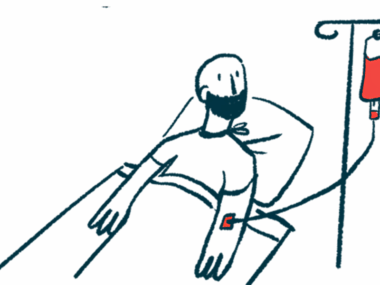Vyvgart approved as add-on in UK for adults with AChR-positive gMG
Therapy's OK supported by data from Phase 3 ADAPT clinical trial
Written by |
Vyvgart (efgartigimod) won approval in the U.K. as an add-on to standard therapy for adults with generalized myasthenia gravis (gMG) who are positive for acetylcholine receptor (AChR)-targeting antibodies.
“We are pleased to announce this latest regulatory approval of Vyvgart, another exciting advancement toward our vision of making our innovation available to as many patients as possible,” Tim Van Hauwermeiren, CEO of Argenx, Vyvgart’s developer, said in a company press release.
Argenx will now work with authorities in the U.K. to make the therapy available to patients.
“We look forward to close collaboration with the National Institute for Health and Care Excellence (NICE) and the Scottish Medicines Consortium (SMC) to support broad and rapid access to this new treatment option, connecting eligible gMG patients in the U.K. to the care they need,” Van Hauwermeiren said.
MG symptoms are driven by self-reactive antibodies that interfere with the communication between nerve and muscle cells. The most common type of MG-driving antibody targets AChR, a protein receptor on the surface of muscle cells.
Vyvgart is made to lower these antibody levels by blocking the activity of the neonatal Fc receptor (FcRn), a protein that normally helps prevent antibodies circulating in the blood from being destroyed. By doing so, Vyvgart is expected to help ease MG symptoms.
The therapy is approved in the U.S., Japan, and the European Union.
“Vyvgart is the first-and-only FcRn blocking treatment to receive approval in UK, offering patients and their families a new treatment option that is targeted to the underlying [cause] of the disease and supported by strong efficacy, safety and tolerability data,” said Saiju Jacob, MD, a neurologist at the University Hospitals Birmingham.
Vyvgart’s U.K. approval was supported by data from the Phase 3 ADAPT trial (NCT03669588), which compared its safety and effectiveness against a placebo in 167 adults with gMG.
The results from ADAPT showed more than two-thirds (68%) of AChR-positive patients responded to the therapy, compared to less than a third (30%) on a placebo.
A response was defined as a decrease of at least two points on the MG Activities of Daily Living (MG-ADL) score lasting at least four weeks, considered a meaningful easing of symptoms. Other measures of disease severity favored Vyvgart over a placebo.
Vyvgart was generally well tolerated in the trial. The side effects seen more frequently with Vyvgart were urinary tract and respiratory infections.
“gMG can impact patients and caregivers in every area of life — many are faced with the difficult choice of taking significant time away from work, giving up hobbies or spending less time with their loved ones,” Jacob said. “The marketing authorization of Vyvgart is great news for the gMG community in the U.K., providing a newer treatment option which along with the existing drugs will hopefully reduce the burden of this debilitating disease.”
Before its approval, Vyvgart was available in the U.K. through under an early access to medicines scheme (EAMS). It also received a promising innovative medicine designation from the U.K. Medicines and Healthcare products Regulatory Agency (MHRA) in 2021.




Leave a comment
Fill in the required fields to post. Your email address will not be published.